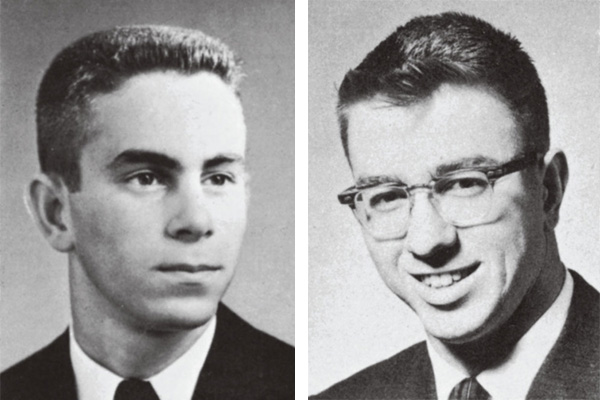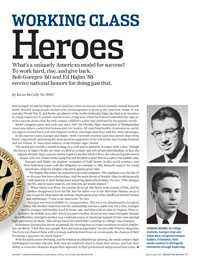Features
 UPWARD BOUND: As college students, Hajim (left) and Goergen were recognized campus leaders. In business, both would continue
to distinguish themselves through leadership. (Photo: University Libraries/Department of Rare Books, Special Collections, and Preservation)
UPWARD BOUND: As college students, Hajim (left) and Goergen were recognized campus leaders. In business, both would continue
to distinguish themselves through leadership. (Photo: University Libraries/Department of Rare Books, Special Collections, and Preservation)Bob Goergen ’60 and Ed Hajim ’58 were just boys when an obscure school counselor named Kenneth Beebe decided young people needed more encouragement to grasp at the American dream. It was just after World War II, and Beebe, an admirer of the works of Horatio Alger, decided as an incentive to young Americans to present awards to two young men whom he believed embodied the rags-to-riches success stories that the 19th-century children’s writer had celebrated in his popular novels.
Beebe’s program grew, and each year since 1947, the Horatio Alger Association of Distinguished Americans inducts a select few business and civic leaders. All come from humble circumstances, and all are eager to reward hard work and character in those who begin their lives with few other advantages.
In the past two years, Goergen and Hajim—both University trustees (past and current chair of the board, respectively) and among the most generous supporters of the University since George Eastman and Joe Wilson ’31—have been winners of the Horatio Alger Award.
The award isn’t merely a medal to hang on a wall and be admired. It comes with a duty. Though the heroes of Alger’s books are often recalled as scrappy and self-reliant individualists, in fact, the original Horatio Alger success stories required another kind of hero: the educated gentleman of means, who saw virtues in the young boy and decided to assist him on a path to the middle class.
Goergen and Hajim are modern exemplars of both heroes in this social contract. And their induction comes with the obligation to continue to offer financial support for young Americans vying for a higher education against great odds.
For Hajim, this makes his induction especially poignant.
“My emphasis over the last 25 or 30 years has been scholarships. And the main thrust of Horatio Alger is taking people with austerity in their background and giving them scholarships,” he says. “This changed my life, and in many respects, our interests are totally aligned.”
When Hajim was three, his parents divorced. His father took custody of him, and his mother disappeared from his life. But his father was in the Merchant Marine, away at sea except for short intervals at home. Hajim spent most of his childhood in foster homes and orphanages. “I was a one-man team,” he says.
Goergen was born in Buffalo to a young mother. The two were abandoned by Goergen’s father. His mother remarried, but the relationship was not a stable one. For a time, Goergen and his younger half-brother lived in foster care, and then with an aunt in Virginia. They returned to the Buffalo area, after which Goergen’s mother divorced and remarried again.
Despite her difficulties, Goergen’s mother was a stalwart source of emotional support for her sons and had high aspirations for them. “She always had in her mind that I would go to college,” says Goergen. In business, Goergen has
shown an aptitude for knowing how to create conditions in which employees can thrive. “I feel that most people don’t start out as superstars,” he once told Wharton Magazine. “So if you can channel them with a strategy and help them focus on certain goals, the chances of their becoming a superstar are much higher.”
With the public sector shrinking, and the reliance on philanthropy growing, the social compact Alger mythologized remains relevant. Both men are routinely asked to share their stories, and how their ability to overcome obstacles shapes their approach to their professional and personal lives today.

